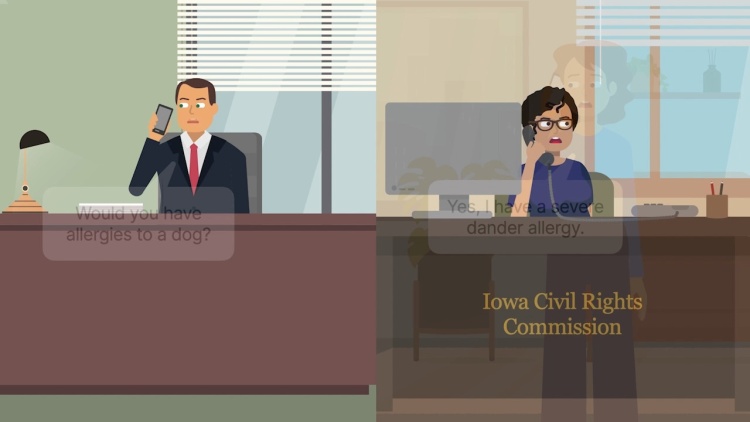Cohen v. Clark
Iowa Supreme Court
2020 WL 3524851 (2020)
- Written by Liz Nakamura, JD
Facts
Karen Cohen (plaintiff) rented an apartment from 2800-1 LLC (landlord) (defendant) in reliance on the no-pet policy in the written rental agreement Cohen signed in November 2015. Cohen had a severe, medically documented allergy to pet dander. The rental agreement stated that the only exception to the no-pet policy was for reasonable accommodations. In January 2016, David Clark (defendant) entered a lease with the landlord containing the same no-pet policy. Subsequently, with the support of his psychiatrist, Clark requested a reasonable accommodation to have an emotional-support animal (ESA), a dog, to help manage his chronic mental illness. The landlord contacted the Iowa Civil Rights Commission (ICRC) and a staffer advised that the landlord needed to try and reasonably accommodate both Cohen’s allergies and Clark’s ESA. The ICRC did not issue a formal finding that allowing the ESA despite Cohen’s severe allergies would be a reasonable accommodation. The landlord allowed the ESA and attempted to mitigate Cohen’s allergies by having Clark and Cohen use different staircases and providing an air purifier in Cohen’s apartment. The mitigation efforts were ineffective in preventing Cohen’s allergic reactions. Cohen sued the landlord, seeking damages for breach of the no-pet clause of the rental agreement. The landlord argued that Clark’s ESA request had to be granted because it was a reasonable accommodation under the Iowa Civil Rights Act. Despite noting the landlord should have denied Clark’s ESA when it proved impossible to accommodate Cohen’s allergies, the district court dismissed Cohen’s complaint, finding that the law on reasonable accommodations was not clear and that the landlord acted in good faith and with the belief that Clark’s ESA request could not be denied. Cohen appealed.
Rule of Law
Issue
Holding and Reasoning (Christensen, C.J.)
Concurrence/Dissent (Appel, J.)
Dissent (McDonald, J.)
What to do next…
Here's why 907,000 law students have relied on our case briefs:
- Written by law professors and practitioners, not other law students. 47,100 briefs, keyed to 996 casebooks. Top-notch customer support.
- The right amount of information, includes the facts, issues, rule of law, holding and reasoning, and any concurrences and dissents.
- Access in your classes, works on your mobile and tablet. Massive library of related video lessons and high quality multiple-choice questions.
- Easy to use, uniform format for every case brief. Written in plain English, not in legalese. Our briefs summarize and simplify; they don’t just repeat the court’s language.





